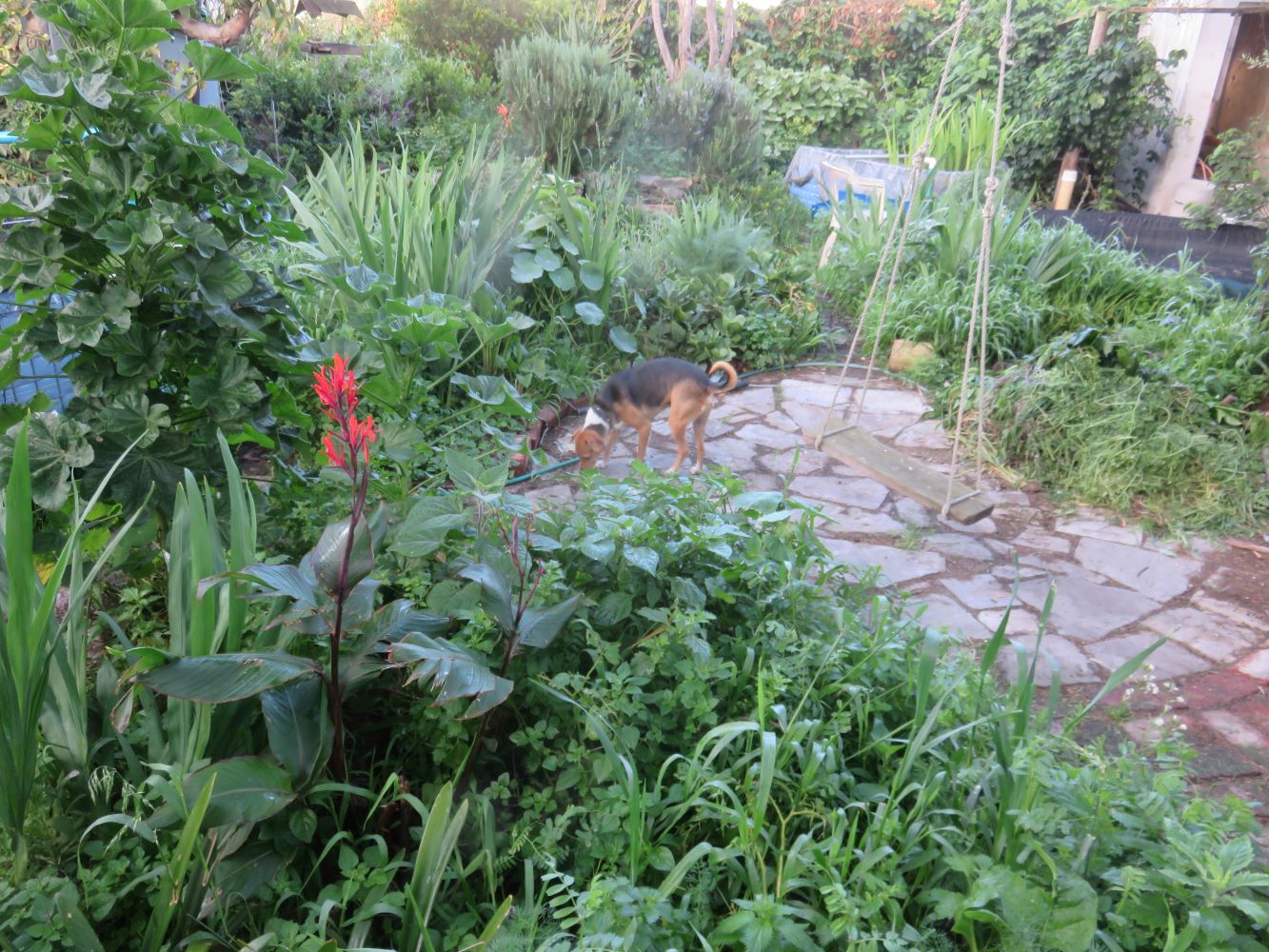Dear Reader, in this age of AI created content, please support with your goodwill someone who works harder to provide the human-made. Sign up in the righthand column or bottom of this page. You will receive my hand illustrated monthly newsletter RESTORE NATURE and access to the biodiversity garden design course as I write...and nothing else, I respect your time.

Why regenerative gardening ?
If you are already an organic gardener …. do you really need to go regenerative on top of that ? Yes, I think so, and there is a lot of evidence, which is increasing by the day as more studies are done.
What are the benefits ?
There are too many benefits to list, this is just a sample.
Established regenerative systems are less work. Regenerated soil needs less water and definitely fewer organic additives like manure.
Regenerated soil produces healthier food and healthier humans. It is known that about 90% of human disease is related to diet. Our food today is hugely reduced in nutrients compared to a hundred years ago. Organic food is better, from having no poisons, and a lot of added organic material, but regenerated soil has such a diverse microbiome and such good texture that plants grow in as perfect conditions as is possible, and this makes them more nutrient dense.
Regenerative techniques like close planting produce more food.
Healing of the planet's soils is accomplished by regenerative agriculture, but not by organic, unless it is regenerative-organic. Healing the planet's soils will reduce and perhaps reverse climate change. It can potentially save us.
Regenerative soil management reduces soil loss, and we are heading for a day zero with soil, losing 4 tons of fertile top soil per hectare globally.
Regenerated soil can maximize our use of currently deforested land so that no new deforestation is needed to feed humanity.
In short, regenerative gardening can make gardening easier, cool the planet, feed the world and make humans a lot more healthy.
But isn't being an organic gardener good enough ?
As they say in the political classics, if you are not part of the solution, you are part of the problem. Until one has internalized the understanding that makes for truly regenerative practice there are a few tiny bits missing, even from organic, biodynamic and permaculture practice, that make all the difference to climate change and human health.
But gardeners are small fry, what about the commercial farmers ?
I believe gardeners are the most important 'agriculturists' on the planet. In most of the world most of the food is grown on a small scale. We gardeners can wield a mighty lever for change because of our vast numbers. Also because of the attention to detail that is needed for regenerative practice, and the focus on environment before profit, home gardeners are the people who are able to implement this first and show the way with their experimentation and solutions. We must show the way, and change the taste of the customer, and that will change the pressures on commercial farmers.
What is the problem, that I should go to the trouble to fix it ?
Even organic growers can contribute to global warming and soil loss. Over the last few thousand years, farmers using only natural methods and natural materials created the deserts of the middle east and Sahara.
Very often the problem is not in what we ADD to the soil but what we organic gardeners TAKE AWAY.
1. Yes, we don't use chemicals, we nurture the soil with manures and composts, we use companion planting, its all good. But we take away the skin of the earth, and leave her naked for weeks at a time, when we know that one hour is enough to kill the surface microbiome and lead to soil-structural loss and fertility loss down the line.
2. We reduce diversity in the garden, to one crop and one inter crop perhaps, we remove the weeds.
3. We pull the roots out of the ground, and with them the precious rhizosphere microbes.
4. We reduce cover, by planting in rows so that we can hoe between, instead of covering all the earth with plants as is natures way.
5. We dig in the ground to 'loosen' the soil, which is only necessary when we have been destroying rather than building its structure with our practices. The spade and plough rip the fungal network to shreds, depriving plants of nutrients and destroying soil structure.
All of this leads to soil loss which on a global scale promises terrible hunger.
What is the solution ?
The way out is to study and truly internalize the regenerative principles so that we can cut out all harmful practices that we may not recognize as such yet. These principles are :
- No mechanical disturbance (digging and ploughing) or chemical disturbance (all biocides and chemical fertilizers are extremely destructive, and 'natural' biocides also kill useful insects)
- Keeping all the soil covered, all the time (mulching to cover soil immediately after exposing it, but preferably covering it with plants, or living mulch, as they are better at nurturing the soil than compost, manure or mulch. On the scale of an urban garden, mulch is free and everywhere available, and cover crop seeds are very cheap)
- Encouraging diversity (this doesn't mean two, but a minimum of 16 plant species per square meter, and it means providing for fungi, pollinators and predatory insects, and other fauna)
- Keeping living roots in the ground as long as possible (which favors chop n drop, perennial food crops, leaving some big root crops in the ground to rot, and just leaving some plants there, not pulling everything that is not a crop).
- Integrating animals (in the urban
garden the beneficial effect of grazing animals is accomplished by
manuring the soil and clipping and trampling rather than pulling
weeds, composting our own human manure, or using small animals like
chickens).
How difficult is it to go regenerative ?
The largest barrier is in the mind. From personal experience I'd say that it took me a while to really get it. Permaculture got me most of the way there, but sometimes it just doesn't make the point about soil life strongly enough. I've seen really unregenerative permaculture practice for that reason. It was Kiss the Ground which really helped me to understand how to grow my soil and increase its fertility year by year with fewer and fewer inputs.
From personal experience I'd say regenerative gardening is less work than organic gardening. You can get off the hamster wheel of seasonal sowing, daily watering and bi weekly weeding.
1. Regenerative gardening keeps your productive areas delivering for much longer, the plants are more resilient, and because you keep and nurture useful weeds, and allow self seeding, there is less of a desperate scramble to plant up leaf vegetables, as there will be something to supplement your diet most of the year (in our climate of course).
2. Regenerative gardening saves on watering. Once the plants are established you will find they magically need about a tenth of the water they need when soil is bare, even in our dry climate. This is because of the porous soil sponge you have created.
3. It is less work to selectively clip when a weed dominates or shades a crop plant, than it is to weed all the time, and with naked soil there will be weeds all the time.
4. It is much less work to put on deep mulch in a few hours, than it is to keep on weeding daily. Mulch and cover crops are cheap and even free. I harvest my cover crop seeds in the garden, on hikes and use R12 bags of seed mixes from the pet shop. A regenerative garden will produce so much biomass you will not know what to do with it and using it for mulch is one solution to that. Till you can get this perfect organic mulch from your own garden, there are many sources of mulch to fill the gap. In different countries different solutions are available. Americans get cheap or free woodchips from tree cutters. In Cape Town woodchips cost a few rands from the municipality's garden refuse depots. Old thatch can be got for free from thatchers. The fire retardant in it contains phosphates which are a plant nutrient. Leaves and fruit from street trees are in oversupply in many areas, if you don't collect them they just rot on the tar and block the gutters. On the right day you can pick up a truck load of oak leaves along the wealthy golden mile, all nicely bagged.
So there is very little against going
regenerative except the understanding of what it really is, and how
it differs to organic, then the willingness to do so. The rest is
very low cost and very easy. It also works, it is pure magic. It does
what it promises to do. You will know you are helping with the climate crisis. Your inputs will plummet, your weeding,
watering and soil additives become largely superfluous, and your
garden will look fabulous when you are too busy and neglect it for a
while. For gardeners there is no free lunch. Growing food always means work, but you really can minimize it.
------
home page for links to all my topics on regenerative and restorative gardening techniques
------
greenidiom's regenerative gardening blog
------
------
Restore Nature Newsletter
I've been writing for four years now and I would love to hear from you
Please let me know if you have any questions, comments or stories to share on gardening, permaculture, regenerative agriculture, food forests, natural gardening, do nothing gardening, observations about pests and diseases, foraging, dealing with and using weeds constructively, composting and going offgrid.
SEARCH
Order the Kindle E-book for the SPECIAL PRICE of only
Prices valid till 30.09.2023
Recent Articles
-
garden for life is a blog about saving the earth one garden at a time
Apr 18, 25 01:18 PM
The garden for life blog has short articles on gardening for biodiversity with native plants and regenerating soil for climate amelioration and nutritious food -
Cape Flats Sand Fynbos, Cape Town's most endangered native vegetation!
Apr 18, 25 10:36 AM
Cape Flats Sand Fynbos, a vegetation type found in the super diverse Cape Fynbos region is threatened by Cape Town's urban development and invasive alien plants -
Geography Research Task
Jan 31, 25 11:37 PM
To whom it may concern My name is Tanyaradzwa Madziwa and I am a matric student at Springfield Convent School. As part of our geography syllabus for this
"How to start a profitable worm business on a shoestring budget
Order a printed copy from "Amazon" at the SPECIAL PRICE of only
or a digital version from the "Kindle" store at the SPECIAL PRICE of only
Prices valid till 30.09.2023







